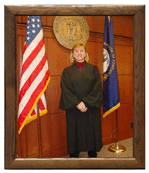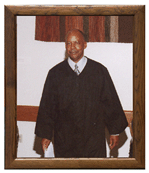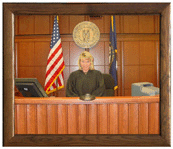Family Affairs
The Pros and Cons of a 'One Family/One Judge' system
By Beth Myers
 Kentuckians do not easily vote in favor of constitutional amendments, but passed one with an overwhelming 4:1 majority last November.
Kentuckians do not easily vote in favor of constitutional amendments, but passed one with an overwhelming 4:1 majority last November.
This amendment authorized the Kentucky Supreme Court to designate a family court division in each of the state's 60 judicial circuits. The original idea of the family court system was to bring a family with multiple issues into one court-basically a one-family/one-judge concept. The Kentucky constitution previously recognized only four court levels; supreme, appeals, circuit and district. Family Court will be a division under the Circuit Court.
Many voters read the amendment for the first time at the polls. Of course, as many observers pointed out, why not vote in favor of the amendment? The Lexington Herald-Leader encouraged their readers to vote "yes" in their November 3, 2002 editorial, and it must have sounded positive to the 710,109 Kentuckians who voted yes. What could be problematic about a family court, where families could bring all their problems to one court and judge?
 |
|
|
Martha Rosenberg, who practices in the area of family law in Fayette County, stated wryly, "Who's going to vote against apple pie?"
Family Court is not a new concept to Fayette County. Before the amendment, all eight circuit court judges heard family court cases. A judge would preside over a circuit court matter, such as a divorce, and would follow through with other connecting matters such as custody and visitation. However, legislation has created a much more complicated animal since the passing of the amendment.
Family law practitioner Elizabeth Hill said, "The idea of family court is a warm and fuzzy idea. It's easy to sell, but a lot harder to create."
Creating this "new" Fayette County family court division is exactly where the problems lie, and judges and lawyers alike have been working hard to produce a quality product. Few people would argue with the value of family court, and the idea of one family/one judge. Many people involved with the judicial system also hoped family court would assist with service delivery to families.
However, participating individuals foresee possible pitfalls and difficulties as this idea becomes a reality in Fayette County. The biggest pitfall may be accessibility-how to create a family court division where cases can be heard in a timely manner, but clients are still handled with sensitivity and patience. Or to put it more simply, create a court where judges do not turn into "docket callers."
 |
|
|
"I'm not sure how the judges will work this out," Hill said. "We need to try to keep the quality of court accessible to people, and keep the quality up for our clients."
Family Court Judge Kim Bunnell spoke of another possible difficulty, "I think the pro side of Family Court is the judge gets to know the families and what's going on with them." She then added candidly, "The down side is the judge gets to know the family and what's going on with them. We will need to be careful to not label families."
Courts, of course, often struggle with accessibility and quality, but the family court division in Fayette County has special difficulties due to legislation that passed during the 2003 General Assembly.
After Kentucky voters shouted out a "yes" to family court in November, the legislature had to buckle down and work on the logistics of the amendment during this past session.
So many cases, so little time
The result was House Bill 380, which stunned some observers with the large number of cases that will now pass through the new family courts. House Bill 380 spells out the types of cases that will be heard in the new family court division-divorce, child custody/visitation/child support, division of property with divorce, adoption and termination, domestic violence and abuse, paternity, dependency/neglect/ and abuse, and juvenile status offenses.
 |
|
|
Family Court Judge Gary Payne in Fayette County stated, "The time may not be adequate for us to hear all these cases. I don't look at the new legislation as great unless you have enough judges. We may have trouble spending time with the cases that need it."
Payne, who also serves in the administrative role of Chief Circuit Judge, was appointed as a Family Court Judge following the November elections. Bunnell, former Chief Judge of Fayette District Court, was also moved to family court; and Judge Joanne Wise was appointed as the third family court judge. These three judges will eventually handle all the cases that are heard by the new Fayette County division of family court.
Bunnell was not surprised by the legislation, "There was a lot of prior discussion about what would be included in Family Court. But I will say that it's going to be a challenge."
Fayette County was not able to add any judge positions for the family court division due to lack of funds, so the three slots were taken from the other courts. Payne moved from a circuit court judgeship to family court, and Bunnell moved from a district court position to family court. Judge Joanne Wise was appointed as a family court judge, in a former circuit court slot. The family court judges will hear both district and circuit court cases, the first time that has happened in a Kentucky court. All the courts are expected to feel the stress of setting up the new division as they struggle to adapt to the changes.
"I am concerned," Rosenberg said, who has been practicing family law since 1981. "I'm concerned people are not going to have access to the courts as easily. We've been spoiled in Fayette. An emergency case can be heard in a matter of days, and a contested divorce can be heard in a matter of months. "
Rosenberg stated that she hadn't seen any problem yet with access to the courts for her clients, but pointed out that the family court division is just starting to take cases from the district courts.
The three family court judges have decided to phase in the district cases gradually, since there was no emergency date set. They maintained the cases of the circuit court including child custody and visitation, maintenance, visitation, divorce, and adoption and termination. In April they started hearing the district cases.
They added paternity and dependency/neglect/abuse cases in April, and juvenile status cases should be added in July.
T. Gerald Ward, who practices in family law, said, "It's going to be a lot of work, but I have confidence in those three judges. It is, however, a time of great change for the court system."
It is expected that the family court division will receive their fourth judge this summer, but Payne greets that possibility with mixed feelings.
"Taking another judge would put more pressure on the remaining five circuit court judges," Payne said, a court system that currently has six. "Every case involves a family, in every court. If you put more judges in family court, then you're taking away from another family in circuit or district."
Rosenberg shares this concern, "Another judge will be a necessity, but that's only a stop-gap. Statistically, crime is on the decline, but the one thing that keeps increasing is divorce litigation, so the caseloads will only keep increasing."
Rosenberg also pointed out that divorce has gotten increasingly more complex since she started practicing law. People have become more mobile, which has lead to problems in child visitation, and estates are more complex which leads to difficulties in division of assets. Family law, which has always been labor intensive, needs even more time in litigation.
Rosenberg initially served on the Family Court Task Force set up by Chief Justice Robert Steven of the Supreme Court in 1997, and even then the task force had declared that there should be at least four full-time judges to make it work. Rosenberg stated that the question of jurisdiction for family court was a question in 1997 as well.
They looked at the family court in Jefferson County for information on the process. Family Court had been set up there eleven years ago as a pilot project. However, the general consensus was that family court was not working in Jefferson, where clients had to wait years instead of months for their cases to be heard.
"We knew we wanted to improve on that," Hill said. "We set up a series of protocols for processing family court cases, but we did not want to replicate the model of Jefferson County. The citizens of Fayette County should not have to go through what the Jefferson County citizens did."
The Fayette County Circuit Court has followed those protocols ever since, until the legislation passed this winter.
"One thing that will be absolutely critical for the success of family court is getting judges committed to the betterment of the system," Rosenberg stated, who mentioned that Kentucky does not require any specialization or certification for lawyers or judges in family court. "A concern of the task force in 1997 was burnout for the judges. If they aren't committed to family court, then they can easily burn out. This is the kind of job where you have to go the extra mile."
Due to different concerns surrounding family law, several attorneys who practice in that area have decided to seek alternative solutions to court litigation for families. These twenty attorneys form the group called Collaborative Law of Central Kentucky, a type of law that works toward settlement. Family Court Judge Joanne Wise, who practiced family law before her appointment, received training in collaborative law as did every attorney who belongs to the group.
"There has to be alternatives to litigation," family law practitioner Elizabeth Hill said. "In family court we're not doing it right. We're creating more problems. Litigation can eat up marital estate, and people eat themselves up. Collaborative law can be a tremendous way of helping people. We'll be able to use it for a variety of cases."
These participating attorneys also feel that collaborative law can be part of the solution to the huge amount of cases that are presided over in family court. If more cases can be handled and settled outside the court system, then more time can be given to the cases that must be litigated.
Divorce, which makes up the majority of family law, is particularly well suited to collaborative law. The attorneys and clients sit down together, with everyone agreed to work towards a settlement. This type of arrangement also affords clients more time to speak and be heard, which many family law attorneys agree is a critical need of their clients.
"In court, clients get 10 minutes for problems that have been brewing for 25 years," Hill said. "In collaborative law they get a chance to speak; they're in charge."
Family law practitioner Martha Rosenberg agreed, "People often need to verbalize certain things like, 'I didn't want this divorce.' It can be tailored to individual needs, which litigation can not."
Collaborative law can be much more creative and flexible than court litigation as well. Attorneys and clients are not tied to a prescribed amount of money for child support, or standard visitation arrangements. Flexible agreements can be worked out.
More importantly, attorneys feel that collaborative law helps everyone to get to the end of the process with less emotional damage.
"Litigation can often make things much more difficult," Hill stated. "You do something to that relationship that is hard to fix. Emotions run high, and things can get messed up. Children almost always suffer."
HOME | THIS ISSUE | ACE ARCHIVES